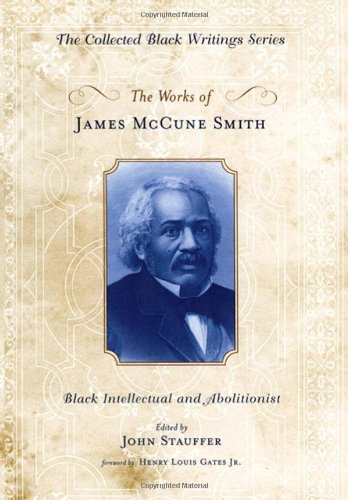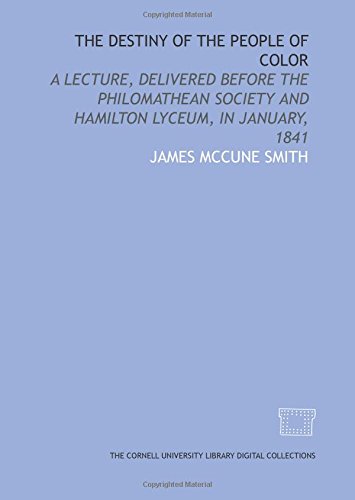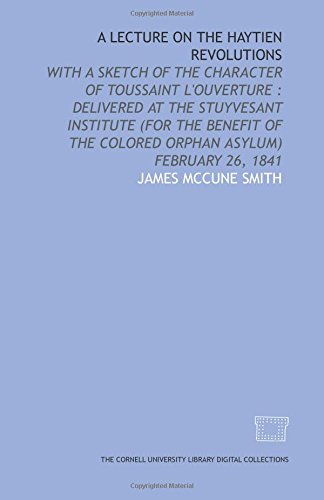Background
James McCune Smith was born in New York City, United States on April 18, 1813, the son of a slave and a self-emancipated woman, some sources say that his parents were of mixed race.



(The first African American to receive a medical degree, t...)
The first African American to receive a medical degree, this invaluable collection brings together the writings of James McCune Smith, one of the foremost intellectuals in antebellum America. The Selected Writings of James McCune Smith is one of the first anthologies featuring the works of this illustrious scholar. Perhaps best known for his introduction to Fredrick Douglass's My Bondage and My Freedom, his influence is still found in a number of aspects of modern society and social interactions. And he was considered by many to be a prophet of the twenty-first century. One of the earliest advocates of the use of "black" instead of "colored," McCune Smith treated racial identities as social constructions, arguing that American literature, music, and dance would be shaped and defined by blacks. Organized chronologically, the collection covers over 40 years of writing, including speeches, letters, and essays, and begins with McCune Smith's first speech as an 11-year old boy to the Marquis de Lafayette. Providing historical context for McCune Smith's current cultural relevance, this book showcases writings on black education and self-help, citizenship, and the fight against racism.
http://www.amazon.com/gp/product/0195309618/?tag=2022091-20

(Originally published in 1843. 16 pages. This volume is pr...)
Originally published in 1843. 16 pages. This volume is produced from digital images from the Cornell University Library Samuel J. May Anti-Slavery Collection
http://www.amazon.com/gp/product/1429747064/?tag=2022091-20

(This volume is produced from digital images from the Corn...)
This volume is produced from digital images from the Cornell University Library Samuel J. May Anti-Slavery Collection
http://www.amazon.com/gp/product/1429706767/?tag=2022091-20
James McCune Smith was born in New York City, United States on April 18, 1813, the son of a slave and a self-emancipated woman, some sources say that his parents were of mixed race.
He attended the African Free School in New York City. Schooled in Scotland Smith continued his education at the University of Glasgow in Scotland, where he received his B. A. in 1835, his master's degree in 1836 and his medical degree in 1837.
Smith worked briefly as a doctor in clinics in Paris, France, but returned to New York City where he opened a pharmacy on West Broadway, the first ever to be operated by an African American. He worked as a physician and surgeon from 1838 until two years before his death in 1865.
For 20 years, he served on the medical staff at the Free Negro Orphan Asylum in New York City. In 1846, a man from Peterboro, New York, donated 120, 000 acres in the state to be divided and given to African Americans living in New York City, as reported the Dictionary of American Biography. Smith and two members of the African American clergy were given the task of selecting the nearly 2, 000 people to receive the land.
Dedicated to doing all he could to support black emancipation and equality, Smith worked as a supporter of the Underground Railroad, a movement to help slaves escape to freedom. He contributed articles to a publication called Emancipator and edited another called Colored American.
Regarded as the most scholarly African American of his time, Smith's writings suggest his wide-ranging interests. His articles include "Abolition of Slavery and the Slave Trade in the French and British Colonies, " 1838; "On the Haitian Revolutions, with a Sketch of the Character of Toussaint L'Overture, " 1841; "Freedom and Slavery for Africans, " 1844; "The Influence of Climate upon Longevity: With Special Reference to Life Insurance, " 1846; "Civilization: Its Dependence on Physical Circumstances, " 1859; "The German Invasion" (which dealt with immigration and how it affected life in America), 1859; "Citizenship" (a report on the Dred Scott decision), 1859; and "On the Fourteenth Query of Thomas Jefferson's Notes on Virginia" (which compared the anatomy of whites and blacks), 1859.
Smith was appointed to teach anthropology at Ohio's Wilberforce University in 1863, but his poor health kept him from taking the position. He died of heart disease at his Long Island, New York, home on November 17, 1865.
He was the first African American to practice medicine in the United States. He is remembered for his successful work as a physician and for his scholarly writings against slavery.
He commented on the positive ways that ethnic Africans would influence US culture and society, in music, dance, food, and other elements. His collected essays, speeches and letters have been published as The Works of James McCune Smith: Black Intellectual and Abolitionist.
(The first African American to receive a medical degree, t...)
(This volume is produced from digital images from the Corn...)
(Originally published in 1843. 16 pages. This volume is pr...)
While many people of the day supported the idea that blacks should be returned to Africa, Smith did not. He met with blacks in favor of the move in Albany, New York, in 1852 and persuaded them to adopt a statement urging the New York State Legislature to reject efforts to send black Americans back to Africa. Smith went as far as to challenge a member of Congress from South Carolina, John C. Calhoun, after Calhoun pronounced that African Americans were prone to insanity. Smith's response, showing the information to be false, was called, "The Influence of Climate upon Longevity. "
Quotations: Smith wrote: ". .. the worst of our institutions, in its worst aspect, cannot keep down energy, truthfulness, and earnest struggle for the right. "
He was a member of the American Anti-Slavery Society. In 1854 he was elected as a member of the recently founded American Geographic Society.
Smith was stocky in build, with a full face and attractive eyes. He was considered an eloquent speaker.
Quotes from others about the person
The historian John Stauffer of Harvard University says: "He was one of the leaders within the movement to abolish slavery, and he was one of the most original and innovative writers of his time. "
in the early 1840s Smith married Malvina Barnet, a free woman of color who was a graduate of the Rutger Female Institute. They had eleven children and five survived to adulthood. The name of one of the children is unknown.
a lawyer
a seaman
a teacher
